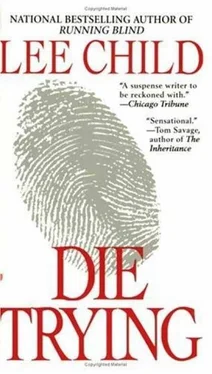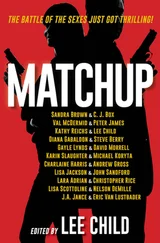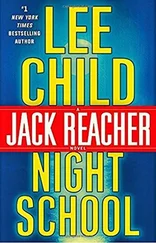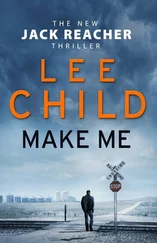“I’m going to call Minneapolis,” Webster said. “We blew it.”
McGrath waited, hoping. He shook his head.
“Not yet,” he said. “That’s a desperation move. Mass panic. Can you imagine the crowds? The evacuation? People are going to get trampled.”
Webster peered out and down. Stared at the road for a full minute. Fifty-four minutes into the fifty-minute envelope.
“Get worse than trampled if that damn truck’s already up there,” he said. “You want to imagine that?”
Time ticked away. Fifty-eight minutes. An hour. The road stayed empty.
“There’s still time,” Garber said. “San Francisco or Minneapolis, either one, he’s still got to be a long way short.”
He glanced at Reacher. Doubt and trust visible in his eyes, in approximately equal measures. More time ticked away. An hour and five minutes. The road still stayed empty, all the way to the distant horizon. The speeding helicopter reeled it in, only to reveal a new horizon, still empty.
“He could be anywhere,” Webster said. “San Francisco’s wrong, maybe Minneapolis is wrong, too. He could be in Seattle already. Or anywhere.”
“Not Seattle,” Reacher said.
He stared forward. Stared on and on. Fear and panic had him by the throat. He checked his watch again and again. An hour and ten minutes. Eleven. Twelve. Thirteen. Fourteen. An hour and fifteen minutes. He stared at the watch and the empty ribbon below. Then he sat back and went quiet. Chilled with terror. He had hung on as long as he could, but they had reached the point where the math went absurd. To be this far south without passing him, Stevie would need to be driving at a hundred miles an hour. Or a hundred and twenty. Or a hundred and fifty. He glanced at the others and spoke in a voice which didn’t sound like his own.
“I blew it,” he said. “It must have been Minneapolis.”
Then the thump of the engines faded and for the second time that day the huge bass roar of the bomb came back. He kept his eyes wide open so he wouldn’t have to see it, but he saw it anyway. Not Marines this time, not hard men camped out in the heat to do a job, but soft people, women and children, small and smaller, camped out in a city park to watch fireworks, vaporizing and bursting into a hazy pink dew like his friends had done thirteen years before. The bone fragments coming out of children and hissing away through the burning air and hitting other children a hundred yards farther on. Hitting them and tearing through their soft guts like shrapnel and putting the luckiest ones in the hospital for a whole agonizing year.
They were all staring at him. He realized tears were rolling down his cheeks and splashing onto his shirt.
“I’m sorry,” he said.
They looked away.
“I got calls to make,” Webster said. “Why is it Minneapolis now? Why was it ever San Francisco?”
“Federal Reserve branches,” Reacher said quietly. “There are twelve of them. The nearest two to Montana are San Francisco and Minneapolis. Borken hated the Fed. He thought it was the main instrument of the world government. He thought it was a big conspiracy to eliminate the middle classes. It was his special theory. He said it put him ahead in his understanding. And he believed the Fed ordered his father’s bank to finagle the old guy into taking a loan so they could deliberately default him later.”
“So Borken’s attacking the Fed?” Johnson asked urgently. Reacher nodded.
“Twin blows,” he said. “In the war against the world government. Attack the old system with a surprise move, like Pearl Harbor. At the same time as setting up a brand-new system for converts to flock to. One bird with two stones.”
He stopped talking. Too tired to continue. Too dispirited. Garber was staring at him. Real pain in his face. The beating of the engines was so loud it sounded like total silence.
“The declaration of independence was only half of it,” McGrath said. “Double decoy. We were supposed to be focused up there, worried about Holly, worried about a suicide pact, going crazy, while they bombed the Fed behind our backs. I figured San Francisco because of Kendall, remember? I figured Borken would target the nearest branch to where his old man’s farm was.”
Webster nodded.
“Hell of a plan,” he said. “Holiday weekend, agents on leave, big strategic decisions to make, everybody looking in the wrong place. Then the whole world looking at the bombing while Borken secures his territory back up there.”
“Where is the Fed in Minneapolis?” Johnson asked urgently.
Webster shrugged vaguely.
“No idea,” he said. “I’ve never been to Minneapolis. I imagine it’s a big public building, probably in a nice spot, parks all around, maybe on the river or something. There’s a river in Minneapolis, right?”
Holly nodded.
“It’s called the Mississippi,” she said.
“No,” Reacher said.
“It damn well is,” Holly said. “Everybody knows that.”
“No,” Reacher said again. “It’s not Minneapolis. It’s San Francisco.”
“Mississippi goes nowhere near San Francisco,” Holly said.
Then she saw a giant smile spreading across Reacher’s face. A final gleam of triumph in his tired eyes.
“What?” she said.
“San Francisco was right,” he said.
Webster grunted in irritation.
“We’d have passed him already,” he said. “Miles back.”
Reacher thumbed his mike. Shouted up to the pilot.
“Turn back,” he said. “A big wide loop.”
Then he smiled again. Smiled and closed his eyes.
“We did pass him,” he said. “Miles back. Right over his damn head. They painted the truck green.”
The Night Hawk swung away into a high banked loop. The passengers swung their gaze from window to window as the landscape rotated below.
“There was paint in the motor pool,” Reacher said. “I tripped over the cans. Probably camouflage base coat. They slapped it on this morning. Damn stuff is probably still wet.”
They saw a Kenworth they had passed minutes ago. It was snuffling along a thousand feet below. Then a long stretch of empty pavement. Then a white pickup. More empty road. Then a dark green panel truck, speeding south.
“Down, down,” Reacher was calling through.
“Is that it?” McGrath asked.
The gap between the panel truck and the pickup in front was lengthening. The truck was falling back. There was nothing behind it, all the way to the horizon. The Night Hawk was losing height. It was dropping toward the truck the way an eagle heads for a baby rabbit.
“Is that it?” McGrath asked again.
“That’s it,” Reacher said.
“It sure is,” Holly whooped.
“You positive?” McGrath asked.
“Look at the roof,” Holly told him.
McGrath looked. The roof was streaked with dark green paint, but he could see it was peppered with tiny holes. Like somebody had fired a shotgun right through it.
“We stared at those damn holes for two whole days,” Holly said. “I’ll remember them the rest of my life.”
“There are a hundred and thirteen of them,” Reacher said. “I counted. It’s a prime number.”
Holly laughed and leaned over. Smacked a joyous high five with him.
“That’s our truck,” she said. “No doubt about it.”
“Can you see the driver?” McGrath asked.
The pilot tilted down and rocked sideways for a close look.
“It’s Stevie,” Holly shouted back. “For sure. We’ve got him.”
“This thing got weapons?” Webster asked.
“Two big machine guns,” the pilot called through. “But I’m not going to use them. That I can’t do. Military can’t get involved in law enforcement.”
“Can you fly this thing straight and level?” Reacher asked him. “Fifty miles an hour? Maybe sixty? Without asking too many questions?”
Читать дальше












